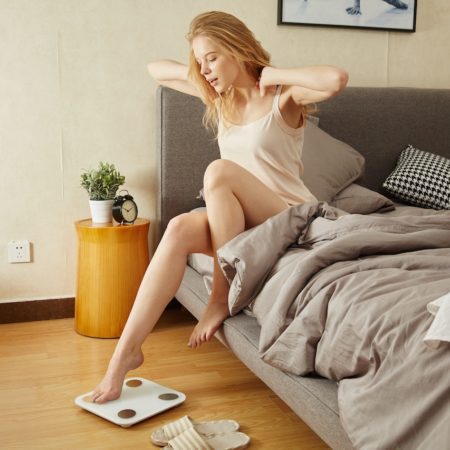How To Recover From Jet Lag And Maintain Your Sleep Routine ?
What causes jet lag?
In many ways, air travelling has improved the quality of our life. It expands our horizons and develops the personality. However, everything has a flip side. The worst enemy of any traveller is the change of time zones. Numerous studies have shown that 90% of long-distance travellers are suffering from circadian rhythm disorder, also known as “jet lag.”.
Maybe you’re a flight attendant, frequent flyer or someone who is planning an extended overseas vacation across various time zones; you are likely to experience the unpleasant phenomenon called jet lag.
Jet lag appears when your inner biological clock is still ticking at the departure time of your home location and is not yet adapted to destination time.
In this Blog Post, you will learn how to mitigate the effects of a Jet Lag and enjoy your holidays better without fatigue, headache and other circadian rhythm disorders. If you are a business traveller, pilot or flight assistant you will appreciate the positive effects for professional reasons.
How long does jet lag last and why it occurs?
A jet lag is a temporary disorder of your inner biological timing system and may last for a couple of days. This so-called circadian mismatch causes many unspecific symptoms like fatigue or insomnia. Our inner circadian rhythm keeps our body in synchronisation with the day and night cycles caused by the rotation of planet earth. The mammalian internal master clock is controlling our circadian rhythms. Its a group of approximately 20,000 neurons just above the optic nerve in the brain.
This Master Clock reacts to the rising and setting of the sun with its different light frequencies and temperature variations and releases specific neurotransmitter and hormones in a cyclical manner which can cause alertness or sleepiness. The circadian rhythm controls everything from the bowel movement, energy metabolism, blood sugar, hormone and neurotransmitter secretion to sleep.
What that means is when we travel through different time zones our inner biological clock and its specific rhythms remain for a couple of days in the time zone of the departure latitude and adapt only slowly to the time zone at the destination.
What is the circadian rhythm (internal biological clock)?
The circadian rhythm is the most critical mechanism for health in general, and with simple lifestyle and environmental changes, you can improve sleep, wakefulness and overall energy levels during your stay in other time zones.
It is essential to know for people often travelling through different time zones that the primary influencers of the internal biological clock are external time cues like light, food intake, temperature and physical activity. The body and brain can react to this time cues, and we can use them to reset the circadian clock and improve the symptoms of a jet lag.
What are the jet lag symptoms ? Can jet lag make you sick?
A jet lag can have a profound effect on your bodies circadian rhythm. The two most significant symptoms are insomnia at night and fatigue during the day accompanied by a decline in alertness, which is temporary and disappears after a few days adaptation in the destination country. Every day, millions of travellers suffer from jet leg symptoms like fatigue and insomnia.
People experiencing a jet lag may also have many other unspecific symptoms like an unexplainable lack of energy, anxiety, sleepiness during the daytime and alertness at night. Other signs of a jet lag are heartbeat arrhythmias, constipation, diarrhoea, headache, irritability, nausea, difficulties concentrating, sweating, and a general decline in well being. Some people also describe an increased susceptibility to illness.
Should you take preventive measures to adjust the jet lag?
When travelling to a new time zone, our circadian rhythms are not adapting immediately to the destination time and remain on their original biological schedule for days. This can result in the jet lag symptoms previously described. A Jet Lag is not an imagination but a real health condition caused by a circadian rhythm disorder. Some concerns regarding your flight schedule and specific behavioural measures before departure, during the journey and after arrival at your destination can help minimise some of the side effects of travelling through time zones.
A Jet lag is a temporary condition, and healthy people usually recover in 3 to 5 days. If you are a business traveller or if you want to enjoy your time at an overseas destination as fast as possible with good energy levels you need to opt for some adjustments and adapt your master clock to the local time cues.
Take the following steps to prevent and mitigate the effects of a jet lag:
Tip 1. When booking a long distance flight, consider a trip with an arrival time at the destination in the afternoon or early evening.
You can go straight after the flight for a light dinner. This way, you can adapt to the time zone from the first day, and the unpleasant experience of the Jet Lag will be less intense. Schedule long flights across more than eight time zones with a layover half the way. This way, you can adapt gradually to the time zone at the destination. Too long voyages are a strain for body and nervous system. A break can alleviate stress and mitigate jet lag.
Tip 2. Don’t go to bed until its bedtime at your destination.
If you arrive in the morning at your destination after an exhausting flight, don’t go to bed and sleep. Relax in the hotel spa or have a walk in the bright daylight. Don’t do intense activities on the first day at your destination. Light is a time cue for your Master Clock and signals daytime while your brain is probably still wired for night time at home.
Tip 3. Do not drink alcoholic one day before, during and one day after the flight.
Alcohol causes dehydration, disrupts the sleeping pattern, lowers heart rate variability and can reduce general well-being.
Tip 4. Stay hydrated all the time.
The dry air and air pressure differences cause dehydration and discomfort. Take plenty of water on the plane, so you never run out of it. The little cups and bottles served on the aircraft are not enough liquid to meet your bodies needs.
Tip 5. Avoid coffee or caffeinated drinks before, during, or just after the flight.
Caffeine causes dehydration and interferes with sleep onset. Caffeine also causes anxiety and stress, which is already intense during transatlantic flights.
Tip 6: Wear comfortable clothes and prepare your flight kit.
Wear warm and comfortable clothes, socks and shoes. Avoid tied pants or shirts which pinch and restrict you in your movements. Get the right outfit for the climate at your destination and take it with you in your hand luggage. On a long flight, the air-conditioning makes it sometimes impossible to feel comfortable. Make sure you have a light, warm jacket or sweater.
Your Travel Kit for overseas flight should contain:
– a sleep mask
– noise control earplugs or headphones
– anti-blue light glasses for the in-flight entertainment and screens.
Tip 7. Jet lag light therapy -expose yourself to natural light.
Use bright light or better natural sunlight in the morning to readjust your circadian rhythm. Sunlight is a critical time cue for the master clock in the brain. Morning sunlight exposure improves alertness, energy levels and improves sleep onset at night. If you wake up later, expose yourself to afternoon sunlight. Light exposure is essential for aligning your inner circadian rhythm to earth time at the latitude of your destination. You can buy small dawn simulators and take them with you if you are travelling to the northern latitudes in the wintertime.
It will help you to overcome the jet lag symptoms fast. If you arrive at 7 p.m. go to bed at your usual schedule at home. If your arrival time is at 7 in the morning have a light breakfast, expose yourself to natural light without sunglasses all day and try to stay awake till the evening. A power nap during the day is good to relax but make sure you put your alarm clock next to you, so you don’t sleep till the evening and screw up your sleep at night.
Tip 8. Check your hotel room.
At arrival in your destination, check your hotel room, especially the noise exposure, bed, air-condition and safety. Change the room in case something is wrong. You want to stay in a safe, quiet and well-tempered room on your holidays or business trip. If this is not the case, you might sleep with half the brain awake, which is a safety mechanism from evolution to keep us alert in strange environments.
Tip 9: Wear anti-blue light glasses starting in the early evening to simulate sunset.
The lower blue light frequencies indicate the brain that its time to sleep. The release and action of hormones like Melatonin will make you fall asleep easier.
Tip 10: Consider taking Melatonin as a supplement for jet lag recovery.
Many people take Melatonin supplements already, but there is not sufficient evidence to confirm its effectiveness. According to my experience, re-adjusting time cues like light, food timing and temperature are more effective.
Valerian root is a supplement with a light sedative effect and can be helpful during the first three days to improve sleep onset at night in the destination. Check with your pharmacist for more details. The FDA has not reviewed this product for safety or effectiveness. Consult your doctor or pharmacist for more details before taking any supplement or sleeping medication.
Tip 11. Time your meals wisely.
Food is a powerful Zeitgeber to improve circadian rhythm, and regularly timed meals can help you to overcome jet lag symptoms fast. Eat breakfast, lunch and dinner at the local time, not when you are hungry. If it is time for breakfast at your destination, you should have breakfast. If you are not hungry, have a light meal. It will give your body the message to set your metabolism to local time. Shortly, your energy levels will improve as well.
Tip 12. Do simple exercises.
Consider exercises in the hotel gym or better outside. You might think it’s not a good idea, and your body is likely to protest, but simple exercises will increase the blood flow, improve your energy and solve the problem with the sleep cycle. Don’t strain yourself but do some simple exercises to warm up. You can do it!



